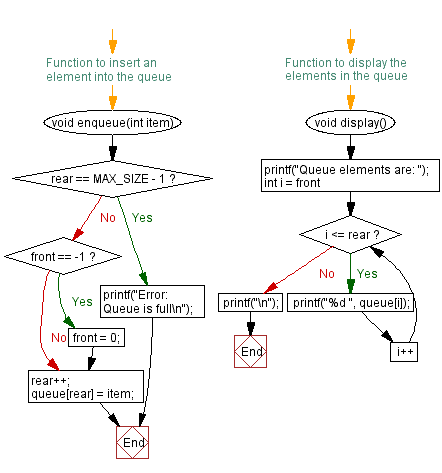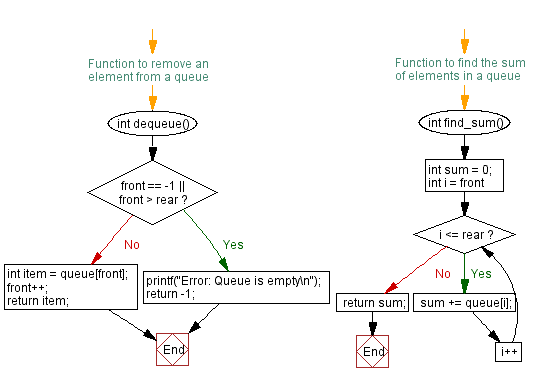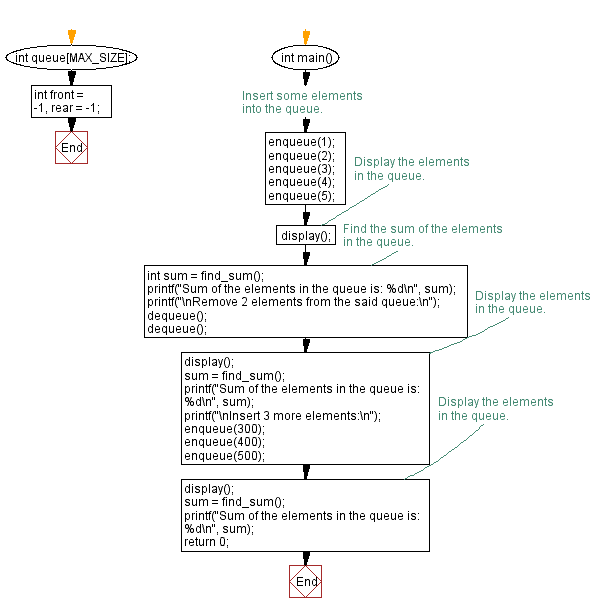C Exercises: Calculate the sum of the elements in a queue
7. Queue Sum of Elements
Write a C program to calculate the sum of the elements in a queue.
Sample Solution:
C Code:
#include <stdio.h>
#define MAX_SIZE 100
// Define a structure for the queue
typedef struct {
int items[MAX_SIZE]; // Array to store elements of the queue
int front; // Index of the front element
int rear; // Index of the rear element
} Queue;
// Function to create an empty queue
Queue* createQueue() {
Queue* q = (Queue*)malloc(sizeof(Queue)); // Allocate memory for the queue
q->front = -1; // Initialize front to -1
q->rear = -1; // Initialize rear to -1
return q; // Return the created queue
}
// Function to check if the queue is empty
int isEmpty(Queue* q) {
return q->rear == -1; // Return 1 if rear is -1, indicating an empty queue
}
// Function to check if the queue is full
int isFull(Queue* q) {
return q->rear == MAX_SIZE - 1; // Return 1 if rear is at the maximum size, indicating a full queue
}
// Function to add an element to the queue
void enqueue(Queue* q, int value) {
if (isFull(q)) { // Check if the queue is full
printf("Queue is full\n"); // Print error message if the queue is full
} else {
if (q->front == -1) { // Check if front is -1 (indicating an empty queue)
q->front = 0; // Set front to 0
}
q->rear++; // Increment rear
q->items[q->rear] = value; // Add the element to the rear of the queue
}
}
// Function to remove an element from the queue
int dequeue(Queue* q) {
int item;
if (isEmpty(q)) { // Check if the queue is empty
printf("Queue is empty\n"); // Print error message if the queue is empty
item = -1; // Return -1 as an indication of an empty queue
} else {
item = q->items[q->front]; // Get the element at the front of the queue
q->front++; // Increment front
if (q->front > q->rear) { // Check if front has crossed rear (indicating an empty queue)
q->front = q->rear = -1; // Reset front and rear to -1
}
}
return item; // Return the removed element
}
// Function to reverse the elements in a queue
void reverse_queue(Queue* q) {
int temp[MAX_SIZE]; // Temporary array to store elements
int top = -1; // Initialize top of the temporary array
// Dequeue elements from the queue and store them in the temporary array
while (!isEmpty(q)) {
temp[++top] = dequeue(q);
}
// Enqueue elements from the temporary array back to the queue, effectively reversing the order
while (top != -1) {
enqueue(q, temp[top--]);
}
}
// Function to display the elements in the queue
void display(Queue* q) {
if (isEmpty(q)) { // Check if the queue is empty
printf("Queue is empty\n"); // Print message if the queue is empty
} else {
// Loop through the elements of the queue and print each element
for (int i = q->front; i <= q->rear; i++) {
printf("%d ", q->items[i]); // Print the element at index i
}
printf("\n"); // Print a newline after displaying all elements
}
}
// Main function to test the program
int main() {
Queue* q = createQueue(); // Create an empty queue
// Add elements to the queue
enqueue(q, 1);
enqueue(q, 2);
enqueue(q, 3);
enqueue(q, 4);
enqueue(q, 5);
// Display the elements in the queue
printf("Queue elements are:\n");
display(q);
// Reverse the elements in the queue
printf("Reverse Queue, elements are:\n");
reverse_queue(q);
// Display the elements in the reversed queue
display(q);
// Add two elements to the queue
enqueue(q, 100);
enqueue(q, 200);
printf("Add two elements to the said queue:\n");
printf("Queue elements are:\n");
display(q);
// Reverse the elements in the queue
printf("Reverse Queue, elements are:\n");
reverse_queue(q);
display(q);
return 0; // Return from the main function
}
Output:
Queue elements are: 1 2 3 4 5 Sum of the elements in the queue is: 15 Remove 2 elements from the said queue: Queue elements are: 3 4 5 Sum of the elements in the queue is: 12 Insert 3 more elements: Queue elements are: 3 4 5 300 400 500 Sum of the elements in the queue is: 1212
Flowchart



For more Practice: Solve these Related Problems:
- Write a C program to implement a queue that updates and displays a cumulative sum with each enqueue operation.
- Write a C program to calculate the sum of the queue elements using a recursive function optimized for tail recursion.
- Write a C program to maintain a running sum in a queue that updates automatically after each dequeue operation.
- Write a C program to compute the sum of a subarray within a circular queue between two given indices.
Go to:
PREV : Queue Reverse Order.
NEXT : Queue Average Value.
C Programming Code Editor:
Have another way to solve this solution? Contribute your code (and comments) through Disqus.
What is the difficulty level of this exercise?
Test your Programming skills with w3resource's quiz.
